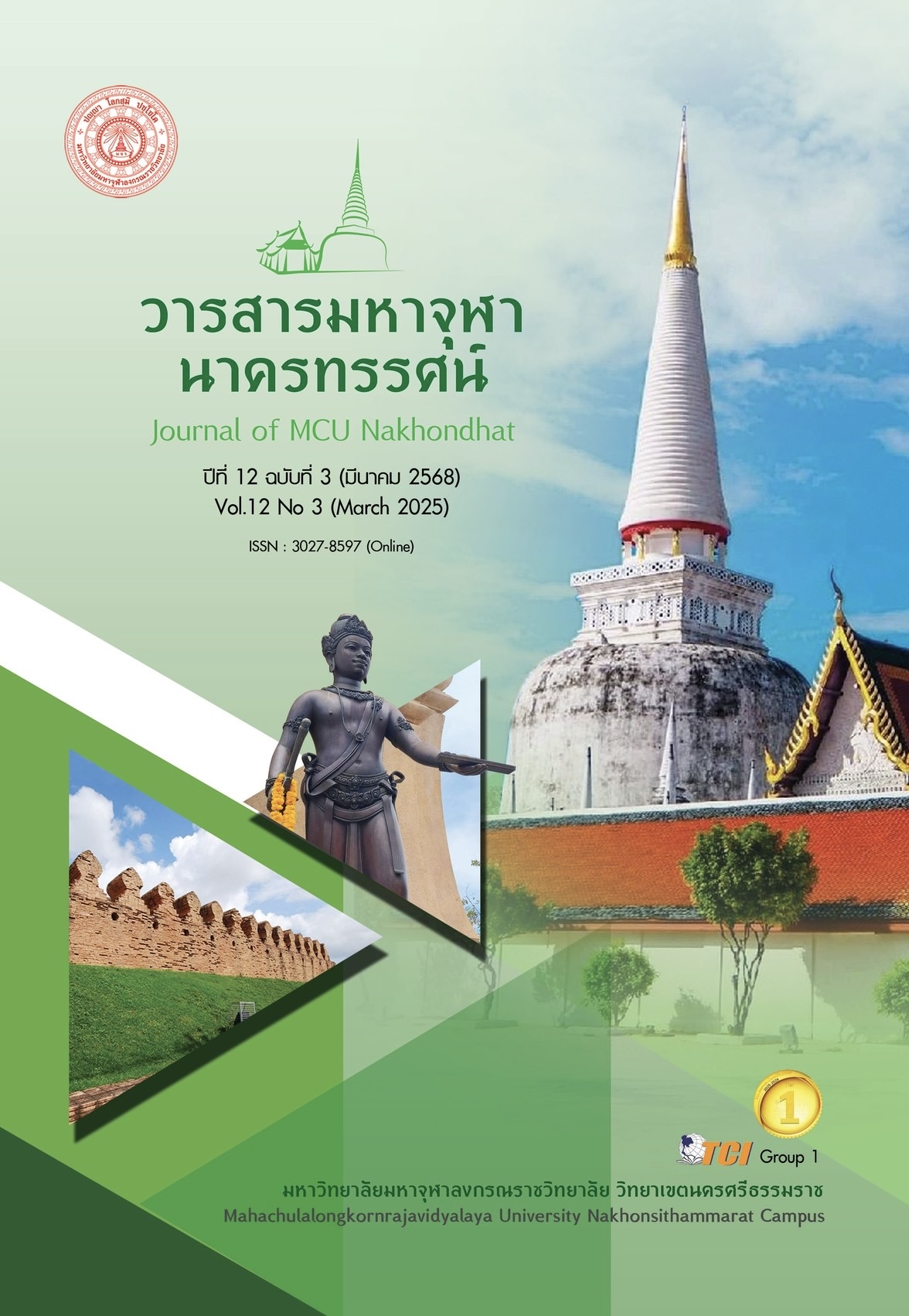THE DEVELOPMENT OF LEARNING GAME ACTIVITIES TO ENHANCE THE ABILITY TO USE SCIENTIFIC EQUIPMENT FOR PRATHOMSUKSA 6 STUDENTS UNDER THE OFFICE OF PRIVATE EDUCATION IN YAN TA KHAO DISTRICT OF TRANG PROVINCE
Main Article Content
Abstract
The objectives of this article were to compare the proficiency in using scientific equipment of students before and after learning with the learning game activity and to study the students' satisfaction with managing science learning. It is experimental research. There were 32 Primary 6 students, Semester 2, Academic Year 2024, selected from Amphawan Witthaya School, Yantakhao District, Trang Province's population and simple multi-stage sampling methodology. The research instruments, such as the learning management plan for developing learning game activities to promote the proficiency to use scientific equipment, consisted of learning management plans,
a proficiency test of using scientific equipment, and a satisfaction measurement form. Percentage, mean, standard deviation, and T-test dependent were used to analyze statistics and data. The results revealed that 1) Students who used 3 games developed by the researcher for learning activities were Science: Speed Game is a game of caution and first aid. Guess the game correctly is a scientific equipment game and Guess the Word Game is a game about maintenance. There was a statistically significant difference in the proficiency to use scientific equipment after studying at the .01 level, and 2) The satisfaction of students the science learning management had the highest mean score when considering each item. Students were satisfied at the highest level in 3 levels, ranked from most to least, as follows: using game activities to help students remember more information, clear and easy-to-understand instructions, and game activities to create fun during studying, respectively.
Article Details

This work is licensed under a Creative Commons Attribution-NonCommercial-NoDerivatives 4.0 International License.
References
กระทรวงศึกษาธิการ. (2560). ตัวชี้วัดและสาระการเรียนรู้แกนกลางกลุ่มสาระการเรียนรู้วิทยาศาสตร์ (ฉบับปรับปรุง พ.ศ. 2560) ตามหลักสูตรแกนกลางการศึกษาขั้นพื้นฐานพุทธศักราช 2551. กรุงเทพมหานคร: โรงพิมพ์ชุมนุมสหกรณ์การเกษตรแห่งประเทศไทย.
จุฑารัตน์ จันทร์งิ้ว. (2566). การพัฒนากิจกรรมการเรียนรู้โดยใช้เกมเป็นฐานร่วมกับ Micro: bit เพื่อส่งเสริมทักษะการคิดเชิงคำนวณ สำหรับนักเรียนชั้นมัธยมศึกษาปีที่ 1 ศึกษามหาบัณฑิต สาขาวิชาหลักสูตรและการสอน บัณฑิตวิทยาลัยมหาวิทยาลัยนเรศวร. ใน วิทยานิพนธ์การศึกษามหาบัณฑิต สาขาวิชาหลักสูตรและการสอน. มหาวิทยาลัยนเรศวร.
ณัฏฐภรณ์ หลาวทอง. (2559). การสร้างเครื่องมือการวิจัยทางการศึกษา. กรุงเทพมหานคร: สำนักพิมพ์แห่งจุฬาลงกรณ์มหาวิทยาลัย.
นฤมล แว่วสอน. (2561). การพัฒนาทักษะการอ่านภาษาอังกฤษโดยใช้แบบฝึกทักษะ สำหรับนักเรียนชั้นประถมศึกษาปีที่ 3. ใน วิทยานิพนธ์ครุศาสตรมหาบัณฑิต สาขาวิชาหลักสูตรและการสอน. มหาวิทยาลัยราชภัฏมหาสารคาม.
ปรมินทร์ ธัญญะภู. (2566). การพัฒนาการจัดการเรียนรู้โดยใช้เกมทางคณิตศาสตร์เพื่อส่งเสริมทักษะการสื่อสารและการนำเสนอทางคณิตศาสตร์ เรื่อง ความน่าจะเป็นสำหรับนักเรียนชั้นมัธยมศึกษาปีที่ 3. ใน วิทยานิพนธ์ครุศาสตรมหาบัณฑิต สาขาวิชาคณิตศาสตรศึกษา. มหาวิทยาลัยราชภัฏมหาสารคาม.
พล เหลืองรังษี. (2568). การวิจัยทางหลักสูตรและการจัดการเรียนรู้. สงขลา: อะวา 2013 จำกัด.
พิชิต ฤทธิ์จรูญ. (2559). หลักการวัดและประเมินผลการศึกษา. (พิมพ์ครั้งที่ 10). กรุงเทพมหานคร: เฮ้าส์ ออฟ เคอร์มิสท์.
ภานุวัฒน์ แสงทอง และพล เหลืองรังษี. (2567). การพัฒนาเกมเสริมหลักสูตรคณิตศาสตร์ เรื่องการ บวก ลบ คูณ หารระคน นักเรียนชั้นประถมศึกษาปีที่ 4 เครือข่ายสถานศึกษาบ้านพรุ พะตง. วารสารสังคมศาสตร์และวัฒนธรรม, 8(3), 110-119.
สถาบันทดสอบทางการศึกษาแห่งชาติ (องค์การมหาชน). (2566). รายงานผลการทดสอบทางการศึกษาระดับชาติขั้นพื้นฐาน (O-NET) ปีการศึกษา 2566. เรียกใช้เมื่อ 20 มกราคม 2568 จาก https://www.niets.or.th/th/catalog/view/497
อธิป อนันต์กิตติกุล. (2564). ได้ศึกษาการพัฒนาความสามารถในการคิดวิเคราะห์ด้วยการจัดการเรียนรู้โดยใช้เกมเรื่อง พัฒนาการ ความ ร่วมมือและความขัดแย้งในประวัติศาสตร์สากลของนักเรียนระดับชั้นมัธยมศึกษาปีที่ 3 โรงเรียนสาธิต มหาวิทยาลัยศิลปากร. ใน วิทยานิพนธ์หลักสูตรศึกษาศาสตรมหาบัณฑิต สาขาวิชาการสอนสังคมศึกษา. มหาวิทยาลัยศิลปากร.
Editverse. (2568). Gamification ในการวิจัย: การมีส่วนร่วมของผู้เข้าร่วมและการรวบรวมข้อมูลในปี 2024. เรียกใช้เมื่อ 20 มกราคม 2568 จาก https://www.editverse.com/th/gamification-ในการวิจัยที่ผู้เข้าร่วมมีส่วนร่วมและรวบรวมข้อมูลในปี-2024/


